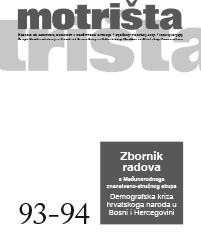Hrvatski jezik kao čimbenik u zaštiti demografske perspektive Hrvata
Croatian language as a factor in protection of the demographic perspective of Croats
Author(s): Šimun Musa, Marija MusaSubject(s): South Slavic Languages, Politics and communication, Politics and society, Social development, Demography and human biology
Published by: Matica hrvatska Mostar
Keywords: Croatian language; language community; planning the status of a language; demography; linguistics; society; Bosnia and Herzegovina;
Summary/Abstract: Croats in Bosnia and Herzegovina are characterised by a strong collective and individual awareness of the idea that they are speakers of Croatian language and that they belong to Croatian language community. However, the territory of that language community has often been unstable and dependent and, therefore, exposed to various administrative solutions, socio-political tendencies or imposed language policies. It is known that language policy is defined by a social group in power using institutional means and methods by which they influence public communications without violating individual and collective identities. Since Bosnia and Herzegovina is a complex sociolinguistic structure where one language community is increasing (Bosnian), the second is stable (Serbian), and the third one is decreasing (Croatian), it should have language policies which would coordinately exist at the state level. That kind of policy would, proving its democratic being, defend a weaker language community, which is not as numerous but it is as sovereign and constituent as the other two language communities in Bosnia and Herzegovina. Raising awareness of language as an essential constituent part of national being is a primary social goal that needs to be achieved by both linguistic and non-linguistic means. Croatian language community is in decline for many reasons: war period, economic migrations, territory reduction, birth rate reduction etc. Its vitality should be supported by demographic policy which would include “planning the status of a language” to ensure equality in different areas of public communication such as administration, politics, education, science, media, and cultural and social area of life in general. The most important function of a language is to enable a speaker to express his/her personal as well as his/her social and national identity. In that wholeness of human being and its subjectivity, language vitality, on which demographic perspective of a nation is based, is crucial.
Journal: Motrišta
- Issue Year: 2017
- Issue No: 93-94
- Page Range: 116-130
- Page Count: 15
- Language: Croatian

